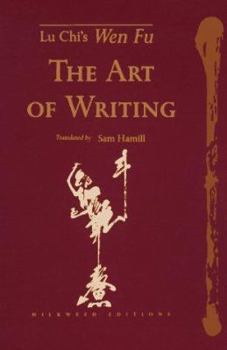The Art of Writing: Lu Chi's Wen Fu
Select Format
Select Condition 
Book Overview
Written in the third century, this is one of the earliest Chinese works about the use of language, preceded only by the Ta Hsueh (Great Learning) of Confucius. Written by Lu Chi, a soldier-poet, the... This description may be from another edition of this product.
Format:Paperback
Language:English
ISBN:091594362X
ISBN13:9780915943623
Release Date:January 1991
Publisher:Milkweed Editions
Length:57 Pages
Weight:0.28 lbs.
Dimensions:0.3" x 6.0" x 9.0"
Customer Reviews
5 ratings
A sublime work from both writers
Published by Thriftbooks.com User , 15 years ago
I am humbled and grateful to learn that Sam Hamil lead the Poets against the war, just a week after getting a copy of Lu Chi's work. That effort, like Lu Chi's work, could well be an honest warrior's work, as poet's work. My perspective for these author's work is rooted in my being a modest (unaccomplished) student of Chinese, Indian and Japanese thought and martial arts for more than 30 years. To read Lu Chi, Sam Hamill is transparent - it is like watching Meryl Step play Julia Child, or consummate Aikido proponent, Bob Poresky use Ikkyo to defend against the 15 attacks. Their signature piece is in leaving not a trace of themselves apparent. And like these masterful artists, in this translation it seems that Lu Chi's work rings through effortlessly and true. Likewise, it also seems to me that Lu Chi's essay is as relevant to martial arts or perhaps any art, as it to writing, at least in several significant ways. He calls for and insists on honesty in work. Each word, no more or less than truth. And how do you know? This book directs you, as well. In similar manner it directs you to where your truth, or story, or character, or interpretation arises. This I suspect is the place where writer's revision takes place, as it is for rehearsal for actors, and training for martial artists. Heed where Lu Chi directs the writer. Coming from that place seems to be what gives birth to mastery. Lu Chi appears to do all this effortlessly, too by capturing the essence of classical thought. It suggests that, as it appears as true today, in Lu Chi's writing and Sam's honest translation, as it was 17 hundred years ago, is why its called classical. And as for writers reading this review, Sam's work also illuminated for me why so many accomplished poets translate. This work, which appears to transcends personality, may well define the essence of his character as a writer. Cheers
One for the backpack
Published by Thriftbooks.com User , 17 years ago
I've had this book for about three years. At the time that I bought it, the title was out of print and I had to buy it direct from the publisher, Milkweed Editions. Along with another classic, Basho's A Haiku Journey, this book never leaves my backpack. I pull them out to free my mind and get me back on track. A must for any writer. Terry Bowman, author of unReQuiTed
When the pupil is ready, the teacher will come.
Published by Thriftbooks.com User , 19 years ago
A few days ago I told someone that I wanted to be able to write more like Lao Tzu. Humility is not one of my stronger suits... That I wanted to be able to write as profoundly and yet concisely as the "OldBoy" himself... I can dream can't I? Today while looking at a book about Thoreau at a local bookstore "Wen Fu" caught my attention. I openned it and discovered that it had been written in the third century by Lu Chi, a soldier-poet. That the "Wen Fu" is a book about the art of writing poetry and intended for those who wish to engage the art of letters at its deepest levels. It discusses the joys and problems that face both writer and reader and provides basic insights about many techniques of this style of writing. The more I read the better it got. It is a book about having the courage of your convictions where writing is concerned. Sam Hamill's Introduction is excellent at setting up Lu Chi's "Wen Fu". I found it very helpful in understanding and appreciating Lu Chi's words about words. "Consider the use of letters. All principles demand them. Though they travel a thousand miles or more, nothing in this world can stop them. They traverse the thousands of years." The art of writing is about using words as much as they use us.
after Aristotle and Sun Tzu, meet Lu Chi
Published by Thriftbooks.com User , 23 years ago
Well, you know the saying, the pen is mightier than the sword, so I guess Lu Chi is mightier than Sun Tzu. This book was written about 1700 years ago by a Chinese noble. The words are very inspiring and quite beautiful. This is a writer's book, one to own if you are a writer, or one to give as a gift that will be appreciated, if you want to make a writer happy. Here's a sample:"Caught between the unborn and the living, a writer struggles to maintain both depth and surface."andon rewriting:"Perhaps only a single blossom from the whole bouquet will bloom."This is a very short book, but one you will revisit.
Inspiration
Published by Thriftbooks.com User , 23 years ago
This beautiful book is an inspiring resource for writers and anyone who is touched by creatvity. I return to its pages of wisdom again and again for guidance as I try to write. It is a classic that must be in every library. I have purchased several to give to friends.





